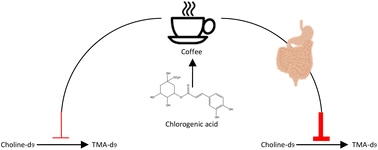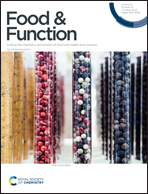Phenolic-rich beverages reduce bacterial TMA formation in an ex vivo–in vitro colonic fermentation model†
Abstract
The production of pro-atherogenic trimethylamine N-oxide (TMAO) is dependent on the gut microbiota metabolism of quaternary amines (i.e., choline) into trimethylamine (TMA). Nutritional strategies that target microbial conversion of choline into TMA could reduce cardiovascular disease and atherosclerosis burden by reducing subsequent formation of TMAO. This study aimed to evaluate (1) whether beverages rich in known inhibitors of TMA production (chlorogenic acid, catechin and epicatechin) can reduce TMA formation and (2) the effect of upper gastrointestinal digestion on efficacy. To do this, either raw or digested coffee, tea and cocoa beverages were evaluated for their TMA-d9 production inhibition in our ex vivo–in vitro fermentation model with human fecal slurries and choline-d9 substrate. Results showed that digestion was required to unlock the TMA-d9 production inhibition potential of coffee and cocoa beverages, and that teas did not possess a strong inhibition potential either digested or undigested. By fractionating digested bioactive beverages, we determined that those fractions rich in chlorogenic acid were the most bioactive. Overall, this study suggests that regular cocoa and coffee consumption could be a nutritional strategy able to reduce TMAO levels. In vivo studies should be carried out to confirm the potential of these beverages as strategies to inhibit TMA production.

- This article is part of the themed collection: International Conference on Polyphenols and Health (ICPH2022) special collection


 Please wait while we load your content...
Please wait while we load your content...